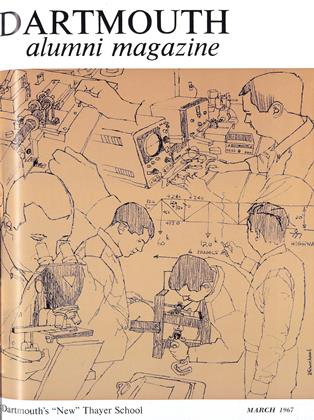His clear-sighted goals gave RICHARD J. MCCLURE '66 of Lake City, Pa., good reason to select the Tuck-Thayer combined Bachelor of Engineering and Master of Business Administration program, which he expects to complete next year.
"I see it as a way of short-circuiting the ten or fifteen years you have to spend in straight engineering before getting into higher management," he explains.
However, his lofty ambitions are not accompanied by a walk-into-what-the-world-owes-me attitude. Dick has worked hard and conscientiously for the honors he has garnered so far.
As an undergraduate he was a member of Phi Beta Kappa and Tau Epsilon Pi and vice president of the Dartmouth Society of Engineers, participated in the Engineering Honors Program, and won a faculty citation in his senior year for "consistently maintaining an excellent performance" in an introductory course in thermostatics and thermodynamics. He holds the 1966 Scott Paper Foundation Leadership Award which carries with it a generous two-year scholarship.
For his Senior Honors project he organized a management information system by distilling reams of computer output into simpler graphical computer displays. Besides completing an undergraduate major in engineering, he had to take the admission test for graduate study in business, work in Accounting, Finance I and Finance II in his senior year, and get the permission of the Tuck and Thayer deans to qualify for this program.
Dick had a good experience last summer, though it was unrelated to his probable project for the B.E./M.B.A. program and not required for admission to Tuck-Thayer. He worked in the Campbell Soup Company's Computer Research and Development Department in Camden, N. J., preparing a study on the possibility of extending distribution of their frozen foods.
He describes the task as involving a lot of "grunt work," obtaining rail rates and tariffs, and recording these on IBM cards. But his weeks of dull preparation finally jelled into workable material.
His major interest now is in industrial dynamics and it will take two years plus a summer to get the combined degrees. He must take the regular courses for an M.B.A. in addition to six technical courses in engineering and complete a project demonstrating creative design.
Despite the frantic pace, he maintains a placid disposition and a personality as straightforward as his intentions.
Dick knows even more definitely what he doesn't want. He rejects government work as too chancy and inconsistent. Consulting firms discourage him because "you leave it to someone else to implement your solution. You don't get the satisfaction of completion."
He identifies easily with Thayer's philosophy of developing practical engineers and says that is the type who break into management. Generally, he's aiming at operations research or corporate planning with a goal toward higher general management. He sees these two departments as "a good way to cut across many areas of a company and meet many of its problems."
He adds a final reinforcing argument for his program and expectations: "A manager with scientific or engineering background saves his company a lot of wasted effort. He can be a better coordinator and doesn't have to rely on the expertise of other engineers. He can make his own evaluation of their recommendations."
 View Full Issue
View Full Issue
More From This Issue
Features
-
 Feature
FeatureTimbers Heads Alumni Council
JULY 1969 -
 FEATURE
FEATURERemnants of a Moment
MAY | JUNE 2016 By GAYNE KALUSTIAN ’17 -
 Feature
FeatureBaker Holds the Key
DECEMBER 1965 By JAMES W. FERNANDEZ -
 Feature
FeaturePeter Blodgutt, Adventure Librarian
October 1995 By Jim Collins '84 -
 Feature
FeatureZ-Man Covers The War
FEBRUARY 1991 By Robert Eshman '82 -
 Feature
FeatureSinging for Walter
February 1993 By Sydney Lea







